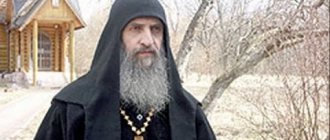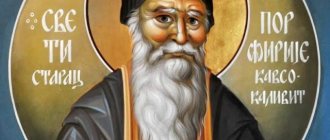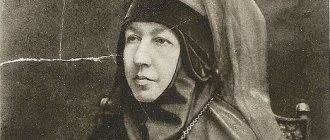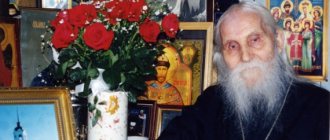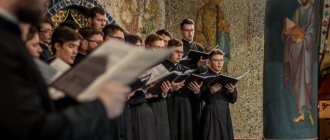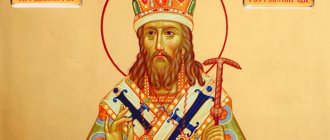The family into which Georgy Breev was born was not Orthodox at all
Georgy Breev was born on January 8, 1937 in Moscow. His family was completely unbelieving.
January 8, 1937
Georgy Breev's birthday
His father is from the Tula province, after graduating from a parochial school, he moves to Moscow and joins the party.
Afterwards, Father George speaks about that time and about his father:
“...The power of science was proclaimed, and science supposedly refutes all religious tenets.
This was the ideological attitude of the time to which he succumbed.
Although he himself told me: “I believe, dear.
I even grew up in the church on the choir.
And when I came to Moscow, they opened up an understanding of something higher, something different, and I became carried away...”
Georgy Breev
priest
Mother Georgia was born into a peasant family in the Ryazan province. Afterwards she came to Moscow, where she met George’s future father.
At the age of 18, Georgy Breev was baptized.
George came to the Orthodox faith at the age of 18. He began communicating with a believing family, after which he decided to join Orthodoxy - by being baptized.
Father George also comments on how his parents reacted to his baptism:
“...When I was baptized of my own free will, everything was quite calm. When I started going to church every Saturday and Sunday, tension appeared in the attitude of family members towards me.
And when I announced that I would enter the Theological Seminary, everyone became alarmed and reproaches began to pour in that I was ruining my life.
My father considered it his party duty to prevent my decision by all means...”
“...And one day, returning from a party meeting, my father said: “I know why you go to church.
You (the youth) were recruited by American intelligence!”
It turns out that such a message was read to the party members at this meeting...”
Georgy Breev
priest
It was in this family of these people that George met his future bride.
He also remembers this with admiration:
“...An important example for me was a family about whom the whole street knew that they wore crosses and went to church.
Mother and son, about the same age as me, returned from the Leningrad blockade...”
“...I saw that he did not remove the cross.
Naturally, the guys in the yard made fun of this boy, and he was so naive at heart.
What could children know about faith?
And the guys stood him up and said: “Do you believe in demons? Do you believe in God?
He did not deny: “Yes, I know faith, I believe in God.”
And the children laughed at him.
It seemed to me that it was necessary to have some strong arguments against unbelief..."
Georgy Breev
priest
After baptism, he decided to become a priest and devote his life to serving God.
He gets tired of a word that remains unanswered
– The second function of the priest, in addition to performing divine services, is also no less significant, although in our Church it is secondary and even tertiary. This is preaching a sermon, teaching people. We must remember that until the 2nd half of the 18th century, the vast majority of the clergy did not preach at all for centuries. And this area began to develop only in the 19th century, when we gradually developed a layer of educated clergy, accustomed to the idea that preaching is an obligatory component of worship.
And then the clergy was almost completely destroyed, disappeared from life, and if we remember that in the 90s the majority of our clergy had no theological education at all, it is quite understandable that when they came to ministry, many newly ordained priests limited themselves to what they had mastered purely external forms of performing divine services and, above all, requirements that made delivering a sermon unnecessary. The service is long, it’s over, and, thank God, we will leave in peace, but what should we talk about at the service? And so everything is clear. And this function was not performed.
On the other hand, many priests preach, and this poses its own problem.
You see, a sermon helps a priest to intensify his contact with people, to try, while talking about something, to see their inner world in their reaction to his words: of course, if they have any thoughts about Christ, about their own imperfection, and so on Further. Preaching contributes to this.
What if there is no sermon, or is it formal?
I can say from my own experience: I have been delivering sermons for many years, always after the Gospel reading, quite long, at least 15-20 minutes. Over the years, I got the feeling that this was not my monologue. I never prepare for a sermon, I go out and don’t know what I’m going to say. And in the process of conversation, an inexpressible contact arises between you and the flock, you begin to reflect with them on the Gospel text. And the Gospel, for all its simplicity, is a very rich text; there are a lot of layers and subtexts. And especially when the parishioners consist of people you know, you see their lively reactions, based on them you focus your attention on something.
Preaching is a church sacrament; it practically never occurs outside of the liturgy. Unfortunately, even for those who preach, a situation of a tempting nature arises: the priest speaks about things that seem obvious to everyone, everyone seems to understand these things in the same way, but, knowing their lives, he sees how little the meaning of those words is realized in them. which he pronounces. And he himself, often speaking the right words, cannot help but see the distance between word and deed. But by pronouncing words from the pulpit, he takes on a certain kind of obligation. One of the main characters of sermons should be Christ, and, on the other hand, people.
I often hear from parishioners who have listened to my sermons over the years that there is more and more of an emphasis on people, how people respond to Christ. And it is precisely in this aspect of activity that the priest is faced with how little the word in itself means, not backed up by life and deed.
I remember one telling episode when I was still a young priest. The end of the 80s, a funeral service was supposed to take place, which was performed by a more respectable priest, a former actor. And he said: “I need to say something, but I really don’t know anything about the deceased, okay, somehow on autopilot.” I was internally outraged by this approach. But over time I realized that if you remove the almost cynical-sounding term, it is clear what was meant. The point was that, even when addressing strangers, you, as a priest, must tell them what the Gospel should proclaim. Without even knowing how it will be refracted in their consciousness and the circumstances of their lives.
This is a complex process that requires effort. And a person gets tired of it. Tired of words that often go unanswered. This is why it is important throughout the life of a priest to preach to the same parishioners whom you have known for years. But most priests don’t have this; they speak to the crowd.
– That is, they lose meaning in what they say?
- Yes. And there is a feeling of emptiness. Why would I tell God what he already knows? But people are not interested in this.
Photo: simbeparhia.ru
While serving in the army, George has to endure a lot because of his faith.
Soon Georgy goes to serve in the army, where he talks about one incident that happened to him:
“...An army day begins with physical exercises. I'm taking off my tunic.
The foreman yells at the top of his lungs: “Cross! Cross!"…
He rips off my chain with a cross. A flurry of obscene shouts follows...
Immediately, three more soldiers were found to have crosses sewn into their hats and tunics.
Lecturers on atheism urgently begin anti-religious study.
I'm waiting for the outcome. They don't call anywhere.
A young political instructor with the rank of captain comes up in the evening, hands me a torn cross, and asks: “Is this yours? Do you believe?" - “Yes, I am a believer.” - “Take your cross and wear it: no one has the right to forbid you to wear it.
Just remember one condition forever: you do not have the right to impose your religious beliefs on any soldier, otherwise you will have difficulties.”
No one clearly expressed a bad attitude towards me; on the contrary, secretly some of the officers asked questions...”
But it didn’t end there; soon another incident occurred: “...The Holy Gospel lying in the nightstand provoked open discontent of one major, who was responsible for the life of the soldiers.
Many times he demanded that I destroy “this book.”
Unable to disobey the decree, after answering him “I obey!” I did not take any action, for which I was sent to another place of service, to an outpost.
My arrival was preceded by a rumor that “a sectarian is arriving at the outpost, nothing can convince him, don’t fall under his influence...”
Georgy Breev
priest
After graduating from the army, Georgy entered the Moscow Theological Seminary and Theological Academy in 1960. Schema-abbot Savva becomes his spiritual father.
See also the article Father Gennady from Otradny
Schema-abbot Savva is a clergyman, spiritual writer, and resident of the Pskov-Pechersk Monastery. He is revered in the Orthodox community as an elder. Spiritual father of Georgy Breev
While he was studying at the Trinity-Sergius Lavra, he became friends with one of Savva’s spiritual children, Raphael.
Raphael, clergyman of the church, hieroschemamonk, tonsure of the Holy Trinity-Sergius Lavra, widely known critic of ecumenism. Friend of Georgy Breev
George soon wanted to become a monk, but Father Savva blessed George for marriage.
And soon, in his penultimate year at the academy, he married Natalya Mikhailovna, the younger sister of a friend, whom he had known since childhood.
Father Georgy Breev with Mother Natalia Breeva, his wife. They have two children
What makes priests bad psychotherapists
– And finally, one more function, no less tempting, but significant in the life of a priest. This is shepherding, one of the forms of which is clergy. One of the colossal problems of our church life is that our entire pastorate bears the stamp of clergy. All our priests have the right to confess, and all Christians are obliged to confess before communion.
But the majority of our priests do not know how to confess, and the majority of our parishioners do not know how to confess. This led to a colossal profanation of the sacrament of repentance in the form of confession. During confession, people repent least of all. And most of all they are concerned about two things: getting a clear, simple answer to their various questions and hearing a word of reassurance, sympathy, and talking about their problems.
– Get support?
- Yes. “Tell me how should I live?”, “Tell me what should I do?” And what can a priest, not even a young one, but an old one, know about the lives of people who are in many ways different from him? They have their own families, their own professions, their own social environment. And a strange combination of such pseudo-monastic directives “do this, do that” and a very unqualified psychotherapeutic conversation arises.
And you can spend hours, days, months and years in this. And many priests succumb to this, because sometimes they have no other forms of communication with people other than standing with them at the lectern, turning confession into a psychotherapeutic session, bad and unprofessional. Because the topic of confession is a person’s repentance in specific matters, the topic of pastoral conversation is the posing of specific questions, not to bless to undergo surgery, but how to act in a situation from a Christian point of view, from the point of view of the Church.
Moreover, it is not the opinion of the priest that is required, but the opinion of the Church. This all fades into the background. And this enormously breaks priests, turning them into bad psychotherapists. A person has no religious questions at all, but the priest does not feel the right to say: “This is not for me,” if, especially, we are talking about a conversation in confession.
But the priest is alive, and this empty chatter at the lectern is emasculating his soul.
He feels lonely again. This is one of the very important problems.
– Is your family supportive?
- Yes. But I imagine very well that for many priests the family is by no means such a quiet backwater. But rather, it is a reason for temptation when, for example, in the name of the family he forgets his pastoral duty. When a family, often even less developed than he is in a spiritual, religious sense, defines him as simply a breadwinner, it gets to him.
And, at the same time, any person in the family is also experiencing a certain kind of crisis. Such a concept as loneliness together is common to many priests. This aggravates his loneliness, to which he is doomed simply as a priest.
There is a flock that does not become a family. And there is a family, which in the general crisis of the family is often not a help, but a temptation.
See, I tried to explain the reasons for what is called burnout. As you can see, there are a lot of them. But perhaps the most important reason for burnout is that, and I say this as a priest who has been in the priesthood for almost 30 years, as a teacher at a theological school who has been teaching there for the same number of years, that most of the people who come to us are not at all imagine what the ministry of a priest is and what church life is.
The first years of ministry for George are not so easy
In 1968, Georgy graduated from the seminary, and on December 17, 1967 he was ordained to the rank of priest.
Father George talks about his first years of ministry and the difficulties he experienced:
“...The main difficulties are in the spiritual dispensation, in not losing the spiritual attitude towards worship and other priestly duties.
Because the priest, I often say this, comes to give.
But where will he himself receive this charge?
Only at the throne.
During the period of service in the Soviet years, all clergy faced the following difficulties: firstly, there were not enough employees in the parishes.
Moscow churches were overcrowded.
I had to serve for months without days off: one priest and a lot of demands.
In terms of spiritual care for the flock: services are only in church.
Outside the walls of the church, all contacts were stopped.
The sermons have been edited. If people surrounded the priest in large numbers, he could be transferred to distant places..."
Georgy Breev
priest
For his well-written dissertation, he received the title of Candidate of Theology.
Soon he was sent to the clergy of the Moscow Church of the Nativity of John the Baptist, in Presna, where he became the 3rd priest. He served there for 22 years.
After completing his dissertation, he was awarded the title of Candidate of Theology.
1990
this year Father George received a blessing to restore the parish of the Church of the Icon of the Mother of God
In 1990, Father George received the blessing of His Holiness Patriarch Alexy II to restore the parish of the Church of the Icon of the Mother of God “Life-Giving Spring” in Tsaritsyno.
Bishop of the Russian Orthodox Church from June 7, 1990 to December 5, 2008 - Patriarch of Moscow and All Rus'
Archpriest George was appointed rector of the temple. Under his strict leadership, the temple is gradually being restored, but services continue there.
1998
this year Father George was appointed rector of the Nativity of the Blessed Virgin Mary in Krylatskoye
In 1998, Father George was appointed rector of the Church of the Nativity of the Blessed Virgin Mary in Krylatskoye. Also, under the leadership of Father George, the temple was expanded, but the architecture of the temple was preserved. A separate baptismal building and a Sunday school were built.
Father George begins to engage in charitable activities, organizing spiritual education for children and youth.
Since 1998, with the blessing of the Moscow clergy, he has been holding holidays of Slavic literature and culture for schoolchildren. For which Father George subsequently received gratitude from His Holiness Patriarch Kirill.
The priest acts as a ritual and household servant
– Nowadays there is a lot of talk about burnout among charity workers and volunteers, teachers, doctors, and parents. There is less talk about priest burnout. Does such a phenomenon even exist? How widespread is it?
– To be honest, for me burnout is something that is an inevitable part of any person’s life. A person changes, not always for the better, and gets tired of life, profession, and communication with people. It is no coincidence that life is finite. Therefore, the term is very vague and can be applied to any person, regardless of his profession and in relation to the circumstances of his life.
In the context of priestly ministry we can talk about many problems. For me, as a church historian, it would be more appropriate to give a historical excursion that explains a lot. I'll do it later. But still, being also a priest, I would first outline what should constitute the main meaning, the content of the activity of a priest, how this content manifests itself in our modern church life and what costs it may be accompanied by.
It would seem that what lies on the surface? A priest has certain responsibilities. And the first is worship. In order to perform divine services, a person must have an internal need to participate more actively in it, psychologically, morally, intellectually.
And, taking into account the complex structure of our worship, the deep theological meaning of many of our liturgical texts, a person must have the appropriate knowledge to understand what he is doing, what he is saying, what he is doing.
But now I can’t help but wonder: for most modern priests, what becomes the most important thing in worship over time? Moreover, preferred and even desired? It is by no means performing the annual cycle of worship in the church, or even performing the liturgy, but performing the necessities. There are a lot of tasks that they have to perform, which do not require special intellectual, psychological, or moral efforts. And they provide the most tangible and quick income necessary for the priest, because he is not an incorporeal being.
And most importantly, the service is a form of worship that does not require a deep, spiritual connection between the priest and the people who come to perform it. Having performed a prayer service, a memorial service, a baptism, a wedding and the much-loved sacred rite associated with the consecration of an apartment, an office, a car, and in rural areas also a threshing floor, a storehouse, and what not is consecrated, the priest quite quickly completes communication with the person for whom he is performing the task. . Or it may continue with a meal, which usually does not involve serious pastoral conversation. The priest receives a reward and then may not see this person for the rest of his life.
Archpriest Georgy Mitrofanov. Photo: Vladimir Khodakov
And everyone is happy. Everyone has the feeling that the priest has fulfilled his duty. Our contemporaries with little church, near-church, and near-church feel that they have joined church life. And most importantly, there is a feeling that now there is at least some guarantee that the car will not crash, the well will not become moldy, and the apartment will not catch fire. And all this does not at all imply constant communication between this priest and these people, and these people with the priest in the context of general parish life and the celebration of the liturgy.
The priest acts as a ritual and household servant, completely devoid of any spirituality, fulfills the needs of people he barely knows or completely unfamiliar with.
Yes, he receives money for this, and on the basis of this money he can indicate his status in the diocese, pay diocesan dues and demonstrate that there is some kind of life in the parish. But most of the people who come to him are not even parishioners, but visitors.
And this cannot but devastate, or a person begins to condescend to the level of any servant: a hairdresser, a salesman. We have a lot of priests who, after serving for some time, begin to perceive themselves in this way.
– How long might this take, several years?
– Depends on the characteristics of a person’s personality, on the level of his culture. I'll get to this next. You and I have seen that in one of the main functions of a priest there are serious reasons to suddenly feel like a devastated, lonely person, to whom people treat exclusively as a consumer, and to whom he himself begins to treat in the same consumer way, expecting nothing from them except material reward for the time spent, the burden of pronouncing ritual words that are incomprehensible to them, performing ritual actions that are completely incomprehensible to them, which can sometimes be accompanied by a moderately sincere conversation if the performance of the ritual is followed by a meal.
– Doesn’t give anything away and doesn’t fill itself?
– In their relationship there is an imitation of church life. But, in fact, before us, yes, of course, religious life, but of a lower order, this is magic. To paraphrase the famous book of Archpriest Alexander Men, magism without monotheism. Christ in this case is not necessary, he may not exist.
Father George wrote a lot of literature - books and articles
One of Father George’s famous books is called “Rejoice.”
In the book, the priest talks about Christian holidays, the difficulties and joys of human existence, ways to solve “insoluble” problems, and recalls his life. Therefore, the book will be interesting to people of all ages.
The book includes conversations and interviews with Archpriest Georgy Breev, which were published on the pages of the “Family Orthodox Newspaper”
Many Orthodox articles have also been written, such as: “Memories of a spiritual son”, “The Triumph of Orthodoxy”, “On the revered icons of the Mother of God”.
In 2013, a documentary film was made in which Father George starred, entitled “The Flavians.” The purpose of this film is to show, using the example of real clergy, that there are “good shepherds” in our lives - the Flavian Fathers.
They don't burn out because they never burned out.
– That is, the seed of burnout lies long before the priest begins to communicate with the flock?
– You see, burnout can be a tragedy, or it can go completely unnoticed by a burnt-out priest, and simply become a natural process. It did not burn out, and, in fact, did not catch fire. He didn’t burn, he came to work as a ritual and household servant, initially programmed for this.
And, even after going through theological school, he is limited to a minimum of knowledge, which allows him to create the feeling that he can be a servant more attractive than another priest: to say something, to portray something. That is why one of the terrible problems of priests is involuntary acting.
When you realize that you are the way you are, you bear little resemblance to a priest and begin to imitate someone, especially authoritative, elder priests. A creepy role-playing game of priest begins, which cannot help but devastate.
There is no experience of church life, no theological education, much less theological culture.
And most importantly, he does not understand that in order to remain a priest, you need to live a spiritual life. He himself had not yet formed this spiritual life. He continues his ministry without this life.
– Then it turns out that burnout is the lot of a few, only those who are burning inside?
- Yes! Therefore, priests who burn out evoke in me much more not only sympathy, but respect than those who go on like this without burning out, because nothing has ever burned in their souls. Another thing is that this process, of course, will change historically. But now we see a very sad picture: priest burnout is a process that is very difficult for many of us to avoid.
Am I burned out or not? Hard to say. But I understand perfectly well that I am no longer the same as I was before. In some ways I have become better, in some ways worse, it’s probably difficult to talk about it. But, you see, a significant part of our priests have not even reached the point of burnout, and this is the worst thing. These people are unfit for professionalism. In every profession there are unsuitable people.
A person who cannot stand the sight of a dead person and faints at the sight of blood cannot be a doctor. From the very first year such people are expelled, or they leave on their own, and this is completely natural. Yes, the canon prohibits ordaining people whose bodies, for example, reject wine. But this is what concerns the external, physiological manifestations of a person. But there may also be spiritual contraindications.
– What spiritual contraindications could there be? If you imagine such a spiritual doctor issuing a certificate to applicants?
– Psychiatric diagnosis, for example. There is a good test system that helps identify people prone to negative addictions.
– Could alcohol be an attempt to escape burnout?
– As for drunkenness, this phenomenon accompanied the history of our clergy, as well as our entire people. It intensified in the 19th century when educated priests appeared in village parishes. They were alienated from the peasant environment and were strangers among the nobility. People with spiritual needs and a higher level of culture had complete isolation, which became a very serious problem.
And only at the turn of the 19th-20th centuries, in the cities, especially when the educated clergy gradually entered the category of the intelligentsia, the priest began to communicate with scientists, public figures, officers, doctors, and his children were intellectuals. But in the villages, isolation remained, and the village priests drank much more because of this, of course. This anesthesia, typical for a Russian person, worked especially well in the clergy, especially since alcohol was always at hand.
– Can a priest be depressed? Real medical depression?
- Why not? He never ceases to be human, that’s one of his problems.
It’s easy to get to Father George; he is always open to communication with parishioners
Many people want to communicate personally with Father George. The first thing many people ask is how to get to him? Indeed, even now, for many years, thousands of pilgrims have been drawn to Father George, seeking blessings and advice.
The Church of the Nativity of the Blessed Virgin Mary in Krylatskoe belongs to the St. George Deanery of the Western Vicariate of the Moscow Diocese. Father George serves here
Father George receives everyone in the church after the evening or morning liturgy.
Father George receives not only adults, but also sick children suffering from various diseases. He gives his blessing and also helps young children to believe in Divine power.
See also the article How to get to Elder Ily Nozdrin in Peredelkino
You can get to Father George at the address: 121614, Moscow, Krylatskie Hills street, territory of the park-reserve.
You can get there using the following route:
- from metro station "Krylatskoye" - 15 minutes on foot;
- from metro station “Molodezhnaya” - bus 732, 829 to the stop “Church”;
- from metro station "Kuntsevskaya" - bus 733;
- from metro station "Polezhaevskaya" - bus. 271;
- from Sokol metro station - trolleybus 19 to Krylatskoye metro station, then 15 minutes on foot.
To find out any details, or clarify any information you are interested in, you can call: (495)413-4566.
Or write by email:
Pilgrimage buses also run to the temple; you can sign up for such a trip by phone or email.
By leaving a comment, you accept the user agreement

